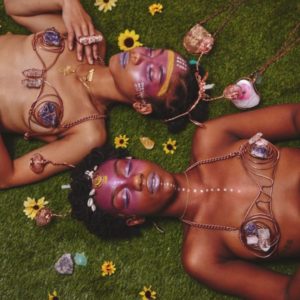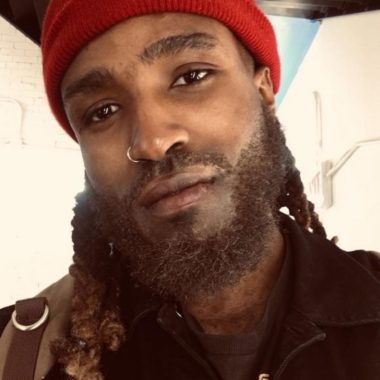Black voices and stories have historically been silenced or pushed to the background. Afrofuturism puts a spotlight on black stories, and conceptually, the genre places black subjects in settings that didn’t usually include or consider them.
Afrofuturism, in short, is where the themes of black culture throughout the diaspora meet technology and science fiction, usually via an artistic medium. Though the term Afrofuturism sprung up in the 1990s, its roots run very deep – Prince, Sun Ra, Grace Jones. Any point in time where black folk use fantasy or technology as a way to redefine themselves, and expand possibilities can be described as Afrofuturistic.
Organized LGBTQ+ ball and house culture that was birthed in 1920s Harlem, for example, is Afrofuturism. Films like Black Panther or the innovative music videos of Missy Elliott all represent Afrofuturism.
Oshun, an extremely talented hip-hop soul duo, are extending the tradition of Afrofuturistic music to a new generation. Group members Thandiwe and Niambi use African and black diasporic themes in their music. Their group name is itself an homage to the Nigerian goddess of rivers, love and fertility, Osun (pronounced Oh-Shoon). The two young DC natives met at NYU while in high school via a scholarship program and immediately bonded.
“Musically and spiritually we always wanted to heal through music. We looked at each other and were like, let’s do this for real, but it wasn’t easy being full-time artists and students. We would be finishing papers before performances.” – Oshun
From their debut studio album Bittersweet Vol.1 (April 2018), it’s clear how gifted and skillful these women are. Thandiwe and Niambi can really rap, really sing and write. Plenty of artists, especially in the NYC scene, use imagery and sound reminiscent of the late 1990s and early 2000s neo-soul golden era – Erykah Badu, Mos Def, D’Angelo. However, these artists usually come off as inauthentic, imitation cheese versions of their predecessors. It’s not good enough to just look the part.
The foresight and skill required to not only match the artistry of musical predecessors, but also be a part of a movement’s evolution, is something very special and hard to manufacture. Nothing about Bittersweet Vol.1 sounds like Karaoke Jill Scott, nothing.
 Thandiwe’s voice isn’t camouflaged in elementary neo-soul runs, or breathy phrasing many singers today use, to mask a lack of vocal ability – nope, sis can sing. Niambi on the other hand, while a talented singer as well, really shines when she showcases punchy rap vocals. Often when Niambi raps, she’s less goddess of love and more warrior queen (see Oya Orisha). She’s all fire and skill, very reminiscent of Left Eye (of TLC) at times. Both women are talented singers and rappers in their own right. Much like Lauryn Hill, they can choose to do either, and most of their songs spotlight how dynamic they both are.
Thandiwe’s voice isn’t camouflaged in elementary neo-soul runs, or breathy phrasing many singers today use, to mask a lack of vocal ability – nope, sis can sing. Niambi on the other hand, while a talented singer as well, really shines when she showcases punchy rap vocals. Often when Niambi raps, she’s less goddess of love and more warrior queen (see Oya Orisha). She’s all fire and skill, very reminiscent of Left Eye (of TLC) at times. Both women are talented singers and rappers in their own right. Much like Lauryn Hill, they can choose to do either, and most of their songs spotlight how dynamic they both are.
Oshun is a special part of hip-hop soul’s evolution and a unique addition to the current roster of hip-hop acts.
“We have so many musical influences like Fela Kuti, Lauryn Hill, Outkast, Parliament Funk. Bittersweet is about the challenges of growing, working, learning lessons and applying wisdom.” – Oshun
The duo puts a strong emphasis on self-love and community. While themes of romantic love and fuck boys can be found in songs like “Crazy 4 You” and “Parts,” Oshun makes self-empowerment the eye of their music. Thandiwe and Niambi are definitely mission-driven artists.
“We all need healing and empathy. Love can be romantic, political, love can be spiritual. The most powerful thing we can do is radiate light and do our part. There is an old saying that goes, when your sister is your hairdresser you need no mirror.” – Oshun
Oshun recently came off their European tour, having amassed an impressive cult following in a relatively short period of time. And with the success of Afrofuturist films like Black Panther and Us, as well as the growing visibility of authentic black content, the possibilities for Oshun’s career are looking even more promising.
Check out Oshun’s latest video for their song, “We’re Yung” and listen to their debut album Bittersweet Vol. 1 on all streaming platforms – Spotify, Amazon and Apple music.
– Roderick Thomas is an NYC-based writer and filmmaker.
Instagram – @Hippiebyaccident
Email – rtroderick.thomas@gmail.com










